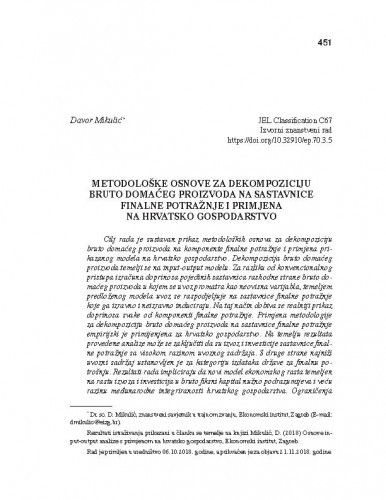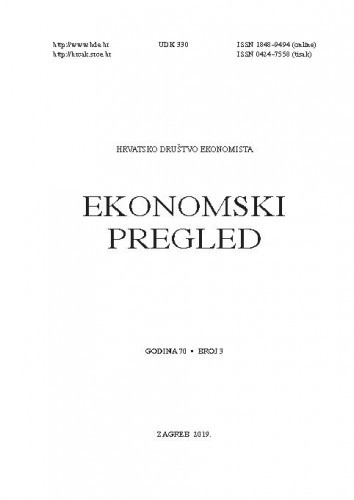Cilj rada je sustavan prikaz metodoloških osnova za dekompoziciju bruto domaćeg proizvoda na komponente finalne potražnje i primjena prikazanog modela na hrvatsko gospodarstvo. Dekompozicija bruto domaćeg proizvoda temelji se na input-output modelu. Za razliku od konvencionalnog pristupa izračuna doprinosa pojedinih sastavnica rashodne strane bruto domaćeg proizvoda u kojem se uvoz promatra kao neovisna varijabla, temeljem predloženog modela uvoz se raspodjeljuje na sastavnice finalne potražnje koje ga izravno i neizravno induciraju. Na taj način dobiva se realniji prikaz doprinosa svake od komponenti finalne potražnje. Primjena metodologije za dekompoziciju bruto domaćeg proizvoda na sastavnice finalne potražnje empirijski je primijenjena za hrvatsko gospodarstvo. Na temelju rezultata provedene analize može se zaključiti da su izvoz i investicije sastavnice finalne potražnje sa visokom razinom uvoznog sadržaja. S druge strane najniži uvozni sadržaj ustanovljen je za kategoriju izdataka države za finalnu potrošnju. Rezultati rada impliciraju da novi model ekonomskog rasta temeljen na rastu izvoza i investicija u bruto fiksni kapital nužno podrazumijeva i veću razinu međunarodne integriranosti hrvatskog gospodarstva. Ograničenja istraživanja proizlaze iz primjene standardne pretpostavke korištene u input-output analizi o fiksnim tehnološkim koeficijentima. Doprinos rada sastoji se u pružanju metodološke osnove koja omogućuje precizniju kvantifikaciju doprinosa pojedinih sastavnica finalne potražnje u odnosu na dosadašnji konvencionalni pristup.; The aim of the paper is to provide a systematic overview of the methodological basis for the decomposition of gross domestic product on final demand components and the application of the presented model to the Croatian economy. The decomposition of the gross domestic product is based on the input-output model. The conventional approach used in calculation of the contribution of individual components of final demand treats imports as an independent variable. However, the alternative model, proposed by this research, distribute imports to the components of the final demand that directly and indirectly induce it. Proposed approach provides a more reliable insight to the actual contribution of each component of final demand. The application of the methodology for the decomposition of gross domestic product to the components of final demand has been empirically applied to the Croatian economy. Based on the results of the analysis, it can be concluded that exports and investments are components of final demand with the highest import content. On the other hand, the lowest import content is found for the government expenditures for final consumption. The results imply that a new model of economic growth based on the growth of exports and investment in gross fixed capital necessarily results in a more intense international integration of the Croatian economy. Limitations of the research arise from the application of the standard assumption used in input-output analysis on constant technological coefficients. The contribution of the paper is related to systematic presentation of a methodological approach that enables a more reliable quantification of the contribution of individual components of the final demand in relation to the conventional approach which is usually used.
Sažetak

 Ekonomski pregled : mjesečnik Hrvatskog društva ekonomista : 70,3(2019) / glavni i odgovorni urednik Dragomir Vojnić.
Ekonomski pregled : mjesečnik Hrvatskog društva ekonomista : 70,3(2019) / glavni i odgovorni urednik Dragomir Vojnić.